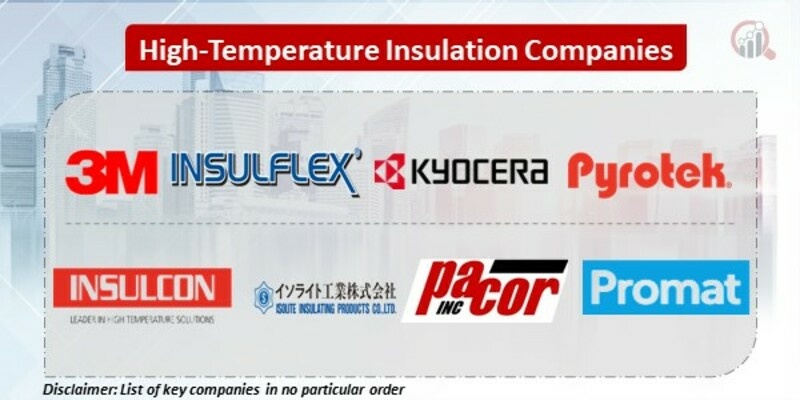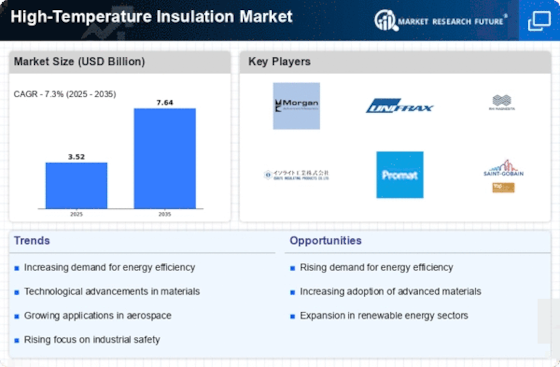Top Industry Leaders in the High Temperature Insulation Market
 Imagine a marketplace where materials dance with scorching temperatures, safeguarding industrial processes and protecting lives. Welcome to the high-temperature insulation market, a realm where innovation and resilience reign supreme. it's no wonder global giants and nimble startups alike are battling for dominance in this fiery arena. Let's peel back the layers of this intense landscape, identifying the players, their strategies, and the latest developments shaping the market's trajectory.
Imagine a marketplace where materials dance with scorching temperatures, safeguarding industrial processes and protecting lives. Welcome to the high-temperature insulation market, a realm where innovation and resilience reign supreme. it's no wonder global giants and nimble startups alike are battling for dominance in this fiery arena. Let's peel back the layers of this intense landscape, identifying the players, their strategies, and the latest developments shaping the market's trajectory.
The Key Players and their Scorching Strategies:
The Incumbents: Global giants like Morgan Thermal Ceramics, Rockwool International, and Saint-Gobain Isover leverage their extensive product portfolios, established distribution networks, and brand recognition. Morgan Thermal Ceramics' wide range of ceramic fiber blankets and boards caters to diverse high-temperature applications.
The Nimblists: Smaller companies like Unifrax and Promat excel in specific niches. Unifrax specializes in high-performance refractory materials for demanding industrial applications, while Promat focuses on lightweight and energy-efficient insulation solutions.
The Innovators: Emerging players like Thermoceramics and Luyang Energy Materials are pushing boundaries with cutting-edge materials and advanced manufacturing techniques. Thermoceramics' nano-engineered ceramic matrix composites offer superior thermal insulation and mechanical properties, while Luyang Energy Materials utilizes recycled materials for sustainable insulation solutions.
Strategies that Stoke the Competitive Fire:
-
Product Diversification: Offering a comprehensive range of insulation materials for various temperature ranges and applications attracts diverse customers. Rockwool International caters to both low and high-temperature needs with its mineral wool and ceramic fiber products.
-
R&D Prowess: Continuous innovation in high-temperature materials and processing techniques is crucial for market leadership. Saint-Gobain Isover's focus on bio-based and recyclable insulation materials demonstrates this commitment.
-
Cost Optimization: Balancing performance with affordability is key, especially in price-sensitive industries. Unifrax utilizes its own raw material production to control costs and offer competitive pricing.
-
Sustainability Focus: Addressing environmental concerns with eco-friendly insulation materials is a growing trend. Promat's use of recycled glass fibers and bio-binders exemplifies this shift.
-
Vertical Integration: Controlling the supply chain and raw materials can offer cost advantages and flexibility. Morgan Thermal Ceramics' backward integration in ceramic fiber production ensures a steady supply for its core products.
Factors Defining Market Share Winners:
-
Industrial Boom: Rising demand from industries like steel, petrochemicals, and power generation fuels the market. Saint-Gobain Isover is particularly well-positioned to benefit from these trends.
-
Energy Efficiency Focus: Stringent regulations and energy cost concerns drive demand for high-performance, energy-saving insulation. Unifrax's energy-efficient refractory solutions cater to this growing need.
-
Sustainability Push: Environmental regulations and consumer preferences favor eco-friendly insulation solutions. Luyang Energy Materials' recycled materials and Thermoceramics' bio-based composites are gaining traction in this segment.
Key Companies in the High-Temperature Insulation market include
- 3M Company (US)
- ADL Insulflex Inc (US)
- Dyson Group (Australia)
- Hi-Temp Insulation Inc. (US)
- Insulcon Group (UK)
- Isolite Insulating Products Company Ltd (US)
- Pacor Inc. (US)
- Promat International NV (Belgium)
- Pyrotek (India)
- Skamol A/S (Denmark)
- Unifrax (India) and Thermal Ceramics (UK)
Recent Developments:
-
September: Saint-Gobain Isover introduces a bio-based mineral wool insulation product for sustainable building applications.
-
October: Thermoceramics patents a new manufacturing process for its nano-engineered ceramic matrix composites, reducing production costs and expanding market reach.
-
November: Promat launches a lightweight and fire-resistant insulation board specifically designed for marine and offshore applications.
-
December: Rockwool International announces a partnership with a leading university research institute to develop the next generation of high-temperature insulation materials for extreme environments.










